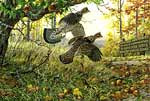In 1994, we switched from beagles to flushing spaniels when we brought home “Bean,” an American Water Spaniel. When Bean was also about 18 months old, we shot 40 woodcock over him between October 5 and 26. Bean retrieved at least one bird each and every day during that 22-day streak.
In contrast, Jake and I started hunting woodcock this year on October 9, eight days after the season opened. We’d had an abnormally dry summer, leaving any bare soil parched and cracked. But a bit of slightly colder and wetter weather on the 7th and 8th finally moved us into our brushy coverts. I write “hunting” rather than “shooting” advisedly. Between October 9 and 26, hunting every day and logging 24 hours afield, we flushed just 13 birds and shot at just one that I thankfully managed to center. Needless to say, Jake will need lots more wild birds than that to help him figure it out for himself. As George Hickox tersely hands down sentence, “No birds, no bird dog.”
Jake and I are hunting the same coverts that I hunted with young Bean. What, then, has changed? Some short time before I was born, or so it sometimes feels in my old bones, Heraclitus declared that no man ever steps into the same river twice. I think he’s got it right in our case. Although I’ve parked the car in the same spots for these last 25 years, my current “I” is not exactly hunting “the same coverts.” Lots of things have changed in that interval, all of them imperceptibly but badly.
First of all, my coverts’ productive acreage has been reduced by more than half. New housing has blossomed on some of our old hotspots. Other properties are now posted against hunting by their recently relocated city slicker owners. The remaining coverts have not been “disturbed” for 25 years. Where the dogwood — “redbush” — was waist high in Bean’s day, now much of it towers 20 feet in the air, giving a gunner scant time to identify and swing on a ‘cock before it’s out of sight.
And since my hearing has suffered 25 more years of wear and tear, I’m usually unable to weaponize the early warning alarm of whistling wings.
Other than hoping for a more historically normal weather pattern next year, there’s nothing I can do to improve my local haunts for Jake’s benefit. It saddens me to realize that I might have to change my preferred quarry, or zip code, or both, to give Jake the same chance to develop into a cherished field companion reminiscent of his predecessors.





